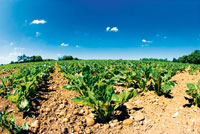British Sugar to grow more beet

British Sugar is set to double the amount of sugar beet it grows itself – arguing that doing so is cheaper than buying the crop from British farmers.
The processing giant plans to rent some 3300ha of land this year in a bid to grow more than 200,000t of beet in 2010/11, Farmers Weekly can reveal. The area is more than twice the amount of land it rented last year.
The decision comes despite a price deal heralded by British Sugar as a new partnership with growers. Unveiled just a fortnight ago, the deal will see beet prices set annually using a mechanism devised by independent agricultural consultants.
British Sugar grew its own beet on some 1600ha of rented land during 2009/10. Lifting will be completed within the next fortnight, with provisional indications suggesting the crop will yield more than 80,000t.
Managing director Gino De Jaegher said: “I know growers hate us doing it but if they were in my shoes, they would do the same. And if I were in their shoes I would hate it with venom – but at the same time I would understand why British Sugar is doing it.”
Despite lower yields than those achieved by growers, British Sugar had learned much by growing beet during 2009. It had proved more cost-effective than buying beet from growers and yields next year were likely to be higher.
“Farmers are much better at growing the crop than we are,” said Mr De Jaegher. “Our yields are below the national average but we got the crop for slightly less than we pay growers. Those are the facts.”
Mr De Jaegher was keen to reiterate that British Sugar would grow only non-quota beet. None of it would be processed into sugar, he said. Instead, it would be turned into bioethanol – much of it at the company’s plant near Wissington, Norfolk.
NFU sugar board chairman William Martin said it was little surprise British Sugar was able to grow beet more cheaply because the company was able to produce it at cost rather than having to make a profit.
But he added: “Some of the cost of production would have been the cost of renting land from farmers, suggesting that some growers could have driven a slightly harder deal with British Sugar than they would have done.”
HGCA senior analyst Jack Watts told NFU conference delegates that the demand for bioethanol could have a huge impact on the grain market. Mr Watts said that millions of tonnes of grain would be taken by the Ensus plant on Teesside and the Vivergo unit in Hull once it had come on stream in late 2010. He predicted that the processing plants would see crops flowing from the south to the north of England to feed the increasing demand.

